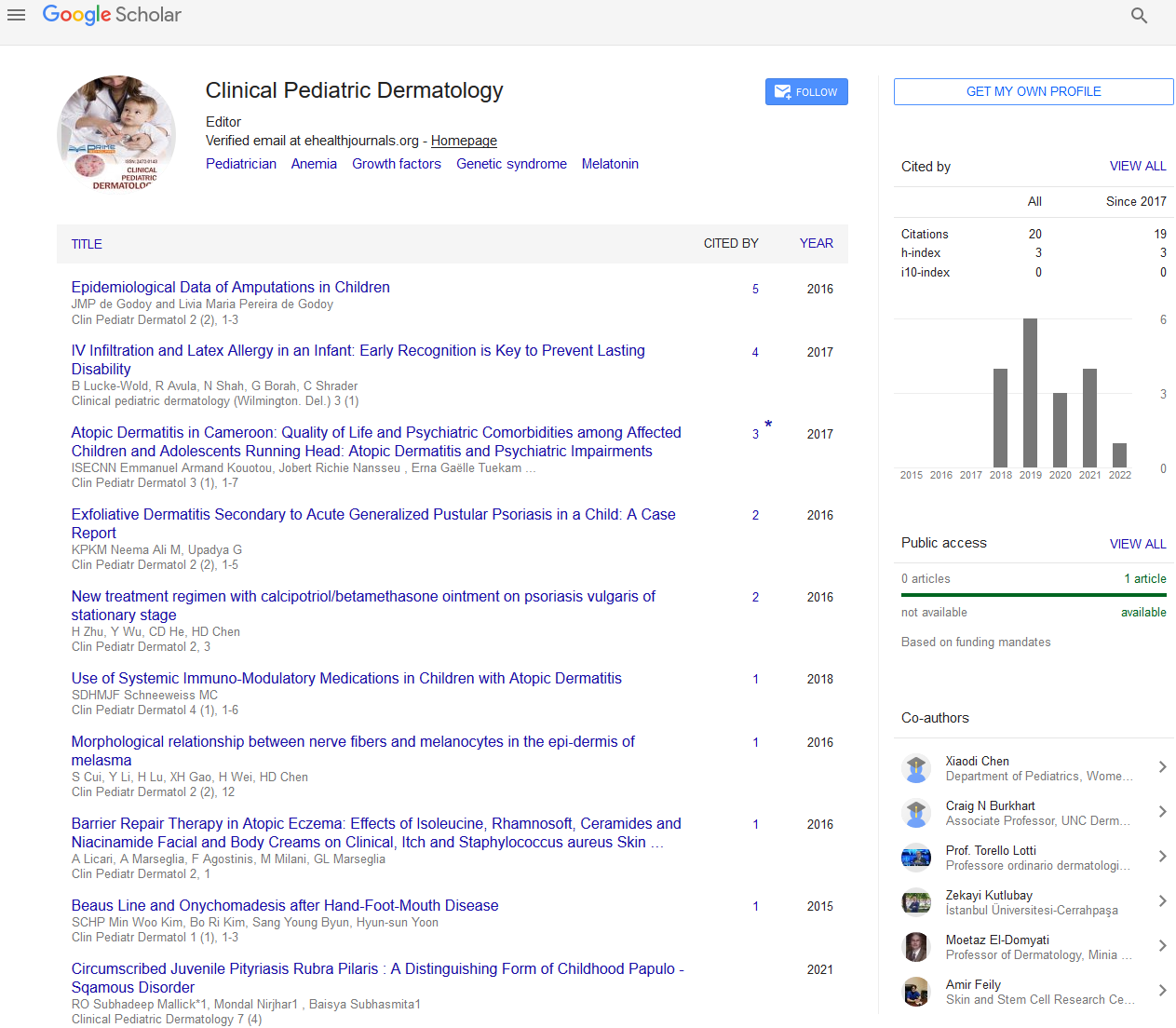Commentary - (2023) Volume 9, Issue 1
The Benefits of Pediatric Dermatology: Caring for Children's Skin Health
James Treat*
Department of Dermatology, University of Pennsylvania, USA
*Correspondence:
James Treat,
Department of Dermatology, University of Pennsylvania,
USA,
Email:
Received: 01-Mar-2023, Manuscript No. IPCPDR-23-16502;
Editor assigned: 03-Mar-2023, Pre QC No. IPCPDR-23-16502 (PQ);
Reviewed: 17-Mar-2023, QC No. IPCPDR-23-16502;
Revised: 22-Mar-2023, Manuscript No. IPCPDR-23-16502 (R);
Published:
29-Mar-2023, DOI: 10.36648/2472-0143.9.1.08
Description
Pediatric dermatology is a specialized branch of medicine dedicated
to diagnosing, treating, and managing skin conditions in children.
Dermatoses pediátricas, or pediatric dermatoses, encompass
a wide range of skin disorders that affect infants, toddlers, children,
and adolescents. From common conditions like eczema and
acne to rare diseases, pediatric dermatologists play a crucial role
in safeguarding the skin health of young patients. In this article,
we will explore the benefits of pediatric dermatology, highlighting
the invaluable contributions it makes toward the overall well-being
and development of children. One of the primary advantages
of pediatric dermatology is the ability to achieve early diagnosis
and intervention. Children may develop unique skin conditions
that differ from those seen in adults, making it essential to have
specialized knowledge and experience in managing pediatric dermatoses.
Pediatric dermatologists possess a deep understanding
of the variations in children’s skin and the specific diseases that
affect them. By recognizing and diagnosing conditions promptly,
they can initiate timely treatment plans, minimizing potential
complications. Moreover, early intervention can prevent or reduce
the risk of long-term consequences. Conditions such as infantile
hemangiomas, a type of vascular birthmark, can lead to functional
impairments or cosmetic concerns if left untreated. Pediatric
dermatologists can evaluate and initiate appropriate treatments,
such as medication or laser therapy, to manage these conditions
effectively. Another significant benefit of pediatric dermatology is
the ability to provide tailored treatment approaches for children.
Children’s skin is unique and requires special considerations due
to its thinner and more delicate nature. Pediatric dermatologists
possess the expertise to adjust treatment modalities, dosages,
and formulations to ensure optimal outcomes while minimizing
side effects. This customization of treatments enhances safety and
efficacy, as it takes into account the child’s age, developmental
stage, and overall health. For example, eczema, a prevalent skin
condition in children, can significantly impact a child’s quality of life. Pediatric dermatologists not only prescribe appropriate topical
treatments but also provide guidance on skin care routines, allergen
avoidance, and lifestyle modifications to manage the condition
effectively. Their comprehensive approach considers the child’s environment,
diet, and potential triggers, leading to better long-term
control and improved quality of life. Pediatric dermatoses can have
a substantial impact on a child’s emotional well-being and quality
of life. Skin conditions such as psoriasis, vitiligo, or severe acne can
cause physical discomfort, social embarrassment, and psychological
distress. Pediatric dermatologists play a crucial role in providing
emotional support to both the child and their family. By creating
a safe and nurturing environment, pediatric dermatologists establish
trust with their young patients, enabling open communication
about their concerns and fears. They educate children and parents
about the condition, fostering a sense of empowerment and understanding.
Moreover, they offer guidance on coping strategies,
self-esteem enhancement, and resources for psychological support
when needed. In addition to diagnosis and treatment, pediatric
dermatologists focus on prevention and education. They educate
parents, caregivers, and children about skincare practices, sun protection,
hygiene, and the recognition of warning signs for potential
skin issues. By providing accurate information and guidance, pediatric
dermatologists empower families to make informed decisions
about their children’s skin health. Pediatric dermatology is a vital
medical field that offers numerous benefits for children with skin
conditions. From early diagnosis and tailored treatment approaches
to psychological support and prevention, pediatric dermatologists
provide holistic care for young patients.
Acknowledgement
None.
Conflict of Interest
Author declares that there is no conflict of interest.
Citation: Treat J (2023) The Benefits of Pediatric Dermatology: Caring for Children’s Skin Health. Clin Pediatr Dermatol. 9:08.
Copyright: © 2023 Treat J. This is an open-access article distributed under the terms of the Creative Commons Attribution License,
which permits unrestricted use, distribution, and reproduction in any medium, provided the original author and source
are credited.

